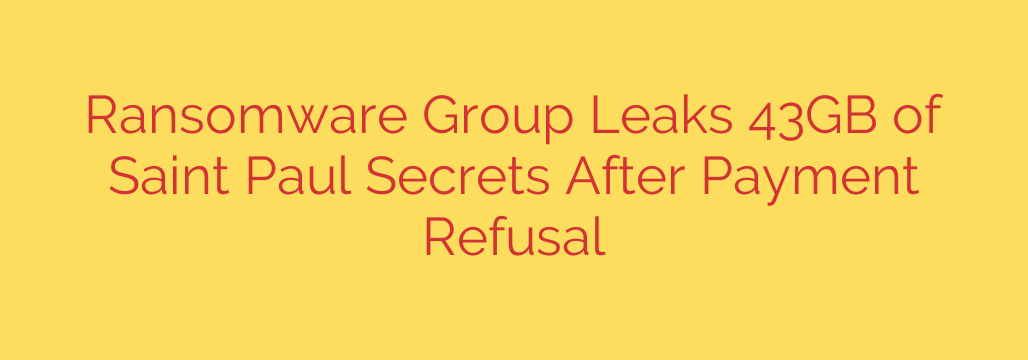
Saint Paul Grapples with Major Data Leak After Refusing Ransomware Demand
The City of Saint Paul is facing a significant cybersecurity crisis after a ransomware group released a massive trove of sensitive data. The leak comes after city officials made the difficult decision to refuse payment to the cybercriminals who had taken their systems hostage.
This incident highlights a dangerous and increasingly common tactic used by ransomware gangs known as double extortion. In this scenario, attackers don’t just encrypt an organization’s files; they first steal, or exfiltrate, large quantities of confidential data. If the victim refuses to pay the ransom for the decryption key, the criminals then threaten to release the stolen information publicly, adding immense pressure on the organization.
In this case, the city held its ground and refused to pay the ransom, a move often recommended by law enforcement agencies like the FBI to avoid funding criminal enterprises. However, the consequence of this principled stand is now clear: the LockBit ransomware group has retaliated by publishing approximately 43 gigabytes of sensitive data on the dark web.
What Was Leaked and Who Is at Risk?
While the full scope of the leaked information is still under investigation, a data breach of this magnitude from a municipal government can have severe consequences. City governments store a vast array of confidential information, putting both employees and residents at risk.
The leaked data could potentially include:
- Personally Identifiable Information (PII): Names, addresses, Social Security numbers, and other private details of city employees and possibly residents.
- Internal Communications: Sensitive emails, internal memos, and strategic documents.
- Financial Records: Budgeting information, invoices, and payment details.
- Legal and Disciplinary Files: Confidential documents related to city operations and personnel.
The public release of such information creates a serious risk of identity theft, financial fraud, and targeted phishing scams for anyone whose data was compromised.
Actionable Security Steps for Residents and Employees
If you are a resident or employee of the City of Saint Paul, it is crucial to act now to protect your personal information. Even if it’s not yet confirmed your data was included, it is always better to be proactive.
Be on High Alert for Phishing: Cybercriminals often use details from data breaches to craft highly convincing phishing emails, text messages (smishing), or phone calls. Be extremely skeptical of any unsolicited communication asking for personal information, login credentials, or financial details. Never click on suspicious links or download unexpected attachments.
Monitor Your Financial Statements: Keep a close watch on your bank accounts, credit card statements, and credit reports for any unusual activity. Consider placing a fraud alert or credit freeze with the major credit bureaus (Equifax, Experian, and TransUnion).
Strengthen Your Passwords: If you have used the same or similar passwords for city-related services and other online accounts, change them immediately. Use strong, unique passwords for every account and enable two-factor authentication (2FA) wherever possible. 2FA provides a critical layer of security that can stop criminals even if they have your password.
Secure Your Identity: Consider signing up for an identity theft monitoring service. These services can alert you if your personal information appears in illicit online marketplaces or is used to open new accounts.
A Sobering Reminder for the Public Sector
This attack on Saint Paul serves as a stark warning for municipalities and public sector organizations across the country. Government entities are prime targets for ransomware gangs due to the critical services they provide and the sensitive data they hold.
The decision of whether to pay a ransom is incredibly complex, with no easy answers. While refusing payment prevents funds from going to criminal groups, organizations must be prepared for the fallout, including massive data leaks and the long, expensive process of recovery and remediation. This incident underscores the absolute necessity for robust, proactive cybersecurity measures, including regular data backups, employee security training, and a comprehensive incident response plan.
Source: https://go.theregister.com/feed/www.theregister.com/2025/08/13/ransomware_crew_spills_saint_pauls/








